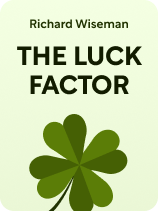

This article is an excerpt from the Shortform book guide to "The Luck Factor" by Richard Wiseman. Shortform has the world's best summaries and analyses of books you should be reading.
Like this article? Sign up for a free trial here.
Is it possible to change your luck? Is there such a thing as good luck and bad luck? What can you learn from bad luck?
In his book The Luck Factor, Richard Wiseman says that there’s no such thing as good or bad luck—it’s all in the way that you frame a situation. Lucky people see “bad luck” as a learning opportunity rather than a setback.
Here’s how you can change your perspective on luck.
Reversing Your Luck
Luck is largely a matter of chance, so why don’t “lucky people” have as much bad luck as good? The secret is that they do—but Wiseman points out that people who identify as lucky change their luck by recasting it in a positive light. They achieve this via several techniques such as reframing situations, avoiding rumination, and taking precautions to prevent bad luck from repeating itself in the future.
Seeing bad luck in a good light isn’t easy, but Wiseman explains that many of his “lucky” research subjects make a habit of imagining how the bad things that happen could have been even worse. For example, suppose you get really sick just before a big convention you’d looked forward to attending. Though anyone would be understandably upset, a lucky-minded person might imagine how much worse it would have been to get sick right before the vacation they’d planned for one month later instead. Wiseman argues that this type of perspective helps lucky people maintain a more positive outlook even on unpleasant experiences.
(Shortform note: Reframing negative occurrences in the way Wiseman describes does more than help you through short-term hardships. In The Happiness Advantage, Shawn Achor explains that training your brain to be positive creates a virtuous cycle: When you repeatedly turn negatives into positives, you create a pattern that increases your a) happiness, which leads to better performance; b) gratitude, which elevates your energy while decreasing anxiety and depression; and c) optimism, which makes you set more ambitious goals, persevere in the face of obstacles, and manage stress and challenges more effectively. Reframing creates emotional momentum to lessen the effects of bad luck so that you more easily notice the good.)
Another trait Wiseman discovered is that lucky people let go of past misfortunes and focus on the future. As stated before, lucky people tend to have faith that circumstances will generally get better over time, whereas many psychological studies have shown that ruminating on the past can create a downward spiral of negative emotions and memories. By keeping an eye on the long-term future, many of the lucky people in Wiseman’s research attributed unexpected benefits to the seemingly unfortunate events in their lives. For instance, a flat tire might make you late for work, but it could also lead to meeting a good mechanic who you come to rely on for maintenance and repairs.
(Shortform note: The problem with focusing on the future is that many people feel anxiety about future events as much as they feel confined by the past. This future focus can impede your ability to appreciate what’s going well for you now and stops you from engaging with your life in a meaningful and joyful way. Therefore, in How to Stop Worrying and Start Living, Dale Carnegie says the answer is to give “today” your full attention. He says that since the only thing you can control is the present moment, the most effective way to prepare for the future is to live to the best of your ability in the now. Over time, a daily commitment to doing your best creates successful results—and opportunities for good luck—that can alleviate your future worries.)
Bad Luck Is a Teacher
Lucky people view any bad luck as a learning opportunity. Instead of giving up when something bad happens, a lucky-minded person will ask why things went wrong and what they can do to improve their odds in similar situations. For example, you might ask why your tire blew out—had you gone too long without having it checked? Lucky people’s proactive approach to bad luck helps them minimize the chances of experiencing it again and often leads to creative solutions to the problems caused by their current misfortune. On the other hand, Wiseman finds that unlucky people tend to chalk their bad luck up to sheer chance and don’t make as much of an effort to prevent it.
(Shortform note: Wiseman’s final point about lucky people highlights a flaw in the way most of us think about learning. In Limitless Mind, educator Jo Boaler writes that we’re often taught from an early age that failure and mistakes are signs of mental weakness, but that’s exactly when the most powerful learning takes place. Brain scans prove that students who spend time correcting mistakes exhibit more mental activity than students who get the right answers on their first try. Therefore, when you have to fight through a problem or work out how to overcome your bad luck, you create more connections in your brain than you would have otherwise. Struggling while learning increases your mental capacity, so bad luck is a boon to mental development.)

———End of Preview———
Like what you just read? Read the rest of the world's best book summary and analysis of Richard Wiseman's "The Luck Factor" at Shortform.
Here's what you'll find in our full The Luck Factor summary:
- The unconscious methods lucky people use
- The benefits of trusting your intuitive hunches
- The scientific explanation as to whether or not luck is real






